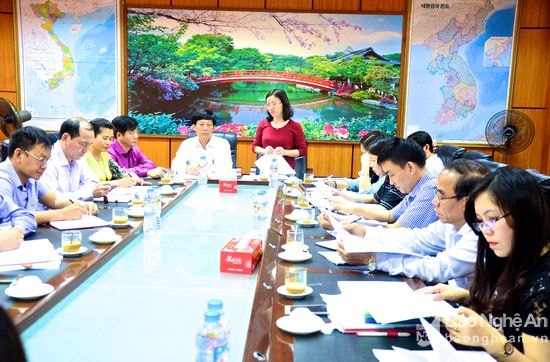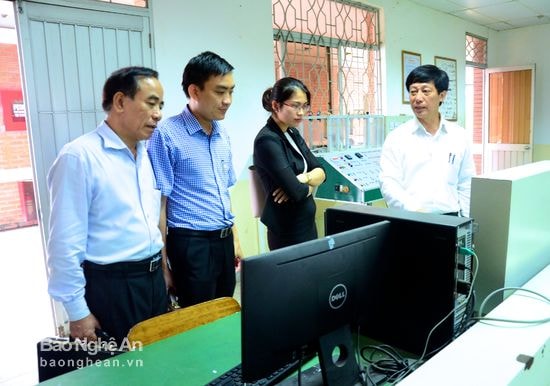Vocational training should be specialized according to strengths, avoiding spreading out.
(Baonghean.vn) - To improve the quality of vocational training, planning is needed.Vocational training network, investment should not be spread out but should focus on the strengths of each school, so that supply can meet demand.That is the recommendation of Vietnam - Korea Vocational College of Technology to the monitoring delegation of the Provincial People's Council.
At the working session, the Vietnam - Korea Vocational College of Technology reported and clarified the concerns of the members of the Provincial People's Council Supervisory Delegation regarding the implementation of the autonomy mechanism in performing tasks, organizing the apparatus, personnel and financial autonomy.
| On the afternoon of March 21, the Supervisory Delegation of the Provincial People's Council led by Comrade Thai Thi An Chung - Deputy Head of the Legal Committee of the Provincial People's Council had a working session at the Vietnam - Korea Vocational College of Technology on the implementation of the autonomy mechanism in public service units. |
Accordingly, every year the school develops a plan to implement medium-term and long-term tasks; proactively cooperates internationally and with businesses in the field of training and providing labor resources.
The school's organizational structure is built on the basis of assigned functions and tasks and actual operating conditions, ensuring streamlining, efficiency, practicality and administrative reform requirements in building work handling processes.
 |
| Working session scene. Photo: Thanh Le |
The school has developed a project on job positions and staff structure according to professional titles. Based on the determination of the school's tasks, the organizational structure of departments, faculties and centers is formed, thereby determining job positions and arranging personnel according to expertise, ability and experience.
Up to now, the Vietnam - Korea Vocational College of Technology has achieved partial financial autonomy (about 20%) and developed specific internal spending regulations. In which, revenue sources include: budget allocation according to regulations, national target programs, foreign and domestic projects, non-governmental organizations, tuition fees and Korean language training services.
“The school has not yet planned to develop a completely autonomous plan because the input revenue is limited, so it cannot balance the revenue and expenditure sources. Therefore, the school will develop an autonomous plan according to the roadmap and plan of the state and the appropriate level of autonomy for vocational training institutions,” said teacher Nguyen Duy Nam, the school’s principal.
 |
| Inspecting teaching facilities at the Vietnam-Korea Vocational College of Technology. Photo: Thanh Le. |
At the working session, the Vietnam - Korea Vocational College of Technology recommended that the province should plan a vocational training network, and that investment should not be spread out but should focus on the strengths of each school, so that supply can meet demand.
"There needs to be a mechanism and policy to care for the teaching staff. In addition, the autonomy of the number of employees should be given to vocational schools so that they can arrange teachers/total number of students to ensure enough teachers to teach. Currently, the Vietnam - Korea Technical Vocational College has 3,000 students but the staff of 89 teachers makes it very difficult for the school to arrange teachers to teach" - teacher Nguyen Duy Nam suggested.
Concluding the working session, Comrade Thai Thi An Chung - Deputy Head of the Provincial People's Council's Legal Committee assessed that the Vietnam - Korea Vocational College of Technology is one of the prestigious vocational training units in the country and the region. Regarding the implementation of the autonomy mechanism, Comrade Thai Thi An Chung suggested that the school should develop a job position project according to the guidance of the Department of Home Affairs; review internal spending regulations. At the same time, proactively provide public services to increase revenue to increase financial autonomy, reduce budget pressure for the province. At the same time, pay attention to building a roadmap to implement the autonomy mechanism in public service units according to the direction of the Provincial People's Committee, contributing to increasing the initiative and improving the operational efficiency of the unit./.
Thanh Le


